Each question contains statements given in two columns, which have to be matched. Statements in column I are labelled as A, B, C and D, whereas statements in column II are labelled as p, q, r and s. Match the entries of column I with appropriate entries of column II. Each entry in column I may have one or more than one correct option from column II. The answers to these questions have to be appropriately bubbled as illustrated in the given example. If the correct matches are A → (q, r), B →(p, s), C →( r, s) and D → (q), then correctly bubbled matrix will look like the following:


A→(p,r)B→(p,r)C→(q,s,t)D→(r)
Topper's Solved these Questions
- THERMAL PROPERTIES OF MATTERBOOK - MODERN PUBLICATIONCHAPTER - THERMAL PROPERTIES OF MATTEREXERCISE - COMPETITION FILE (INTEGER TYPE QUESTION )
12 Videos
- THERMAL PROPERTIES OF MATTERBOOK - MODERN PUBLICATIONCHAPTER - THERMAL PROPERTIES OF MATTEREXERCISE - COMPETITION FILE (EXEMPLAR PROBLEM OBJECTIVE TYPE QUESTION (MULTIPLE CHOICE QUESTION TYPE - I )
8 Videos
- THERMAL PROPERTIES OF MATTERBOOK - MODERN PUBLICATIONCHAPTER - THERMAL PROPERTIES OF MATTEREXERCISE - COMPETITION FILE (ASSERTION REASON TYPE QUESTION )
10 Videos
- SYSTEMS OF PARTICLES AND ROTATIONAL MOTIONBOOK - MODERN PUBLICATIONCHAPTER - SYSTEMS OF PARTICLES AND ROTATIONAL MOTIONEXERCISE - Chapter Practice Test (for Board Examination)
16 Videos
- UNITS AND MEASUREMENTBOOK - MODERN PUBLICATIONCHAPTER - UNITS AND MEASUREMENTEXERCISE - CHAPTER PRACTICE TEST
15 Videos
Similar Questions
Each question contains statements given in two columns, which have to be matched. Statements in column-I are labelled as A and D whereas statements in column-II CP are labelled as p, q, r and S. Match the entries of DP S column-I with appropriate entries of column-II. Each entry in column-I may have one or more than one correct option from column-II. The answers to these questions have to be appropriately bubbled as illustrated in the given example, if the correct matches are A→(q,r),B→(p,s),C→(r,s)andD→(q).
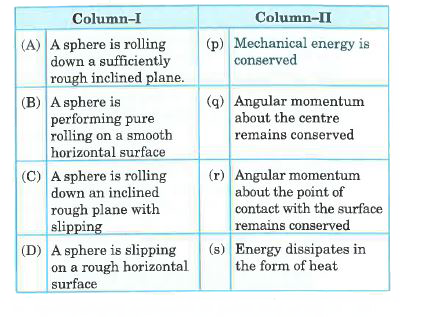
View SolutionEach question contains statements given in two Columns, wihich are to be matched. Statements in Column-I are labelled as A, B, C and D whereas statements in Column-II are labelled as p, q, r and s. Match the entires of Column-I with appropriate entries of Column-II. Each entry in Column-I may have one or more than one correct option from Column-II. The answers to these questions have to be appropriately bubbled as illustrated in the given example. If the correct matches are A→(q,r),B→(p,s),C→(r,s)andD→(q), then correctly bubbled matrix will look like the following:
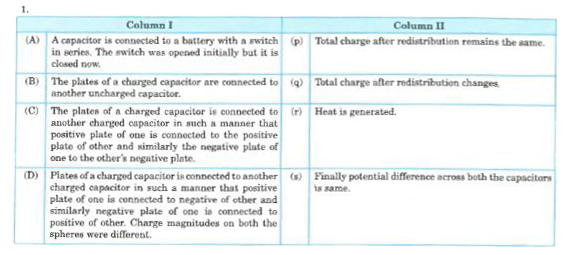
View Solution
Knowledge Check
Each question contains statements given in two columns, which have to be matched. Statements in Column I are labelled as A, B, C and D whereas statements in Column II are labelled as p, q, r and s. Match the entries of Column I with appropriate entries of Column II. Each entry in Column I may have one or more than one correct option from Column II. The answers to these questions have to be appropriately bubbled as illustrated in the following example. If the correct matches are A-4, A-r, B-p, B-, C-r, C-s and D-q, then the correctly bubbled matrix will look like the following:
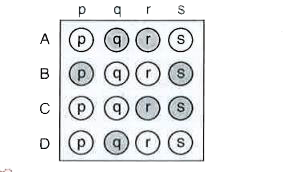
Match the element in column I with the property mentioned in column II
 A(q) , (s)B(p), (q)C(q), ( r)D(p),(q),(s)
A(q) , (s)B(p), (q)C(q), ( r)D(p),(q),(s)
Each question contains statements given in two Columns, which are to be a matched. Statements in Column-I are labelled as B A, B, C and D, whereas statements in Column-II C are labelled as p, q, r and s. Match the entries of D Column-I with appropriate entries in Column-II. Each entry in Column-I may have one or more than one correct option from Column-II. The answers to these questions have to be appropriately bubbled as illustrated in the given example, if the correct matches are A→(q,r),B→(p,s),C→(r,s) and D→(q)
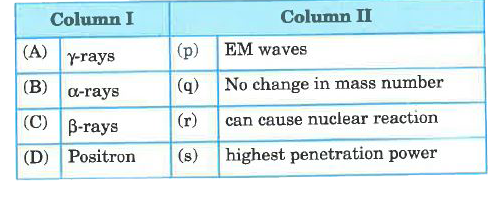
View SolutionEach question contains statements given in two Columns, which are to be a matched. Statements in Column-I are labelled as B A, B, C and D, whereas statements in Column-II C are labelled as p, q, r and s. Match the entries of D Column-I with appropriate entries in Column-II. Each entry in Column-I may have one or more than one correct option from Column-II. The answers to these questions have to be appropriately bubbled as illustrated in the given example, if the correct matches are A→(q,r),B→(p,s),C→(r,s) and D→(q)
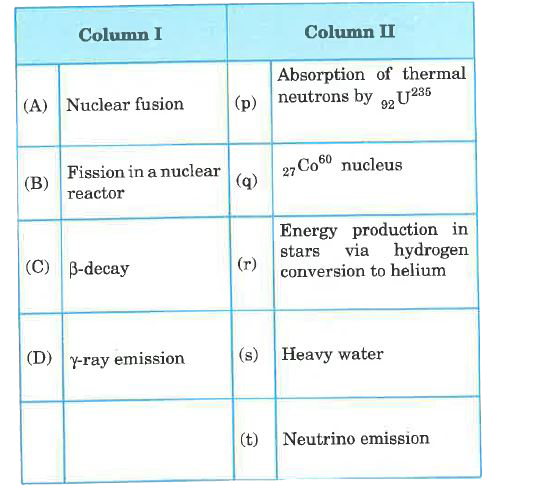
View SolutionEach question contains statements given in two columns, which have to be matched. Statements in Column I are labelled as A, B, C and D whereas statements in Column II are labelled as p, q, r and s. Match the entries of Column I with appropriate entries of Column II. Each entry in Column I may have one or more than one correct option from Column II. The answers to these questions have to be appropriately bubbled as illustrated in the following example. If the correct matches are A-4, A-r, B-p, B-, C-r, C-s and D-q, then the correctly bubbled matrix will look like the following:
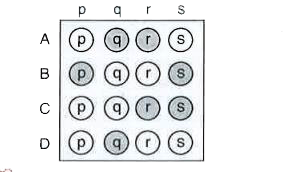
Match the element in column I with the property mentioned in column II
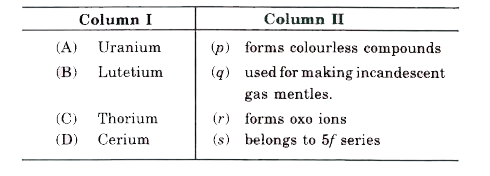
View SolutionEntries of Column-I are to be matched with entrices of Column-II. Each entry of Column-I may have the matching with one or more than entries of Column-II

View SolutionEntries of Column-I are to be matched with entrices of Column-II. Each entry of Column-I may have the matching with one or more than entries of Column-II

View SolutionEntries of Column-I are to be matched with entrices of Column-II. Each entry of Column-I may have the matching with one or more than entries of Column-II

View SolutionEntries of Column-I are to be matched with entrices of Column-II. Each entry of Column-I may have the matching with one or more than entries of Column-II

View Solution
